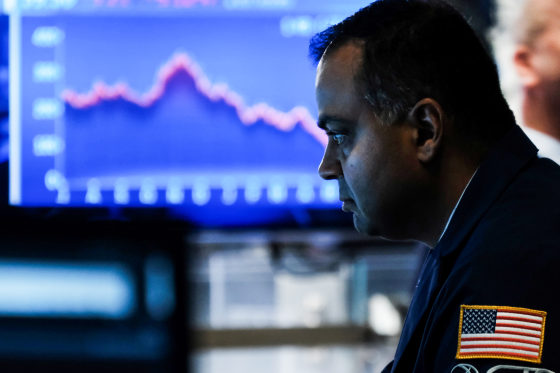U.S. stocks fell on Monday following a major rebound last week from this year’s steep declines. Wall Street is preparing to wrap up the worst first half for stocks in decades.
The Dow Jones Industrial Average fell 61 points, or 0.2%. The S&P 500 dropped 0.3%, and the Nasdaq Composite lost 0.9%.
The major averages struggled to retain gains as investors weighed whether stocks have reached a bottom or are instead briefly rebounding from oversold conditions. Stocks could continue to get a lift in the near term this week, as investors rebalance their holdings for the end of the quarter.
Stocks sank lower in the afternoon after wavering over the flat line earlier in the day. The day’s moves had been “tepid,” Baird’s Ross Mayfield told CNBC, noting that there still isn’t a clear catalyst driving what has been and will continue to be a “meandering” market.
“In these kind of bear market rallies, it’s more about things getting a little too oversold, a little too negative,” he said. “But those aren’t enough on their own to really sustain the rally, they just can provide relief in pockets.”
Mayfield noted that any signs of meaningful easing in inflation would be a positive catalyst for stocks.
“From here, the expectation is probably once again that we’ve hit peak inflation, even if the rollover is very slow, and that financial markets should see reduced volatility into year-end,” said Tom Tzitzouris, head of fixed income research at Strategas. “If we see another push higher in inflation, however, all bets are off and volatility should accelerate again.”
Tech and consumer names dragged stocks down on Monday, as the 10-year U.S. Treasury yield climbed. Gaming names Electronic Arts and Take-Two Interactive were down more than 3% each. Best Buy also fell more than 3%.
Etsy was another top decliner, down 4% following a downgrade by Needham. Shares of Spirit Airlines fell more than 7% after the company said it would accept the latest takeover bid from Frontier Group.
The energy sector was a notable gainer, with Valero and Devon each rising 7%. Marathon Oil added 4%.
BioNTech shares also advanced by about 7% after the drug maker said its Omicron-based Covid-19 booster generates an improved immune response against that variant.
Those moves followed a major comeback week that saw the Dow industrials jump more than 800 points, or 2.7%, on Friday. The S&P 500 popped 3.1%, and the Nasdaq Composite surged 3.3%. Those gains helped the major averages post their first positive week since May.
The S&P 500 is up more than 7% since hitting a bear-market low in mid-June, although the benchmark is still off 19% from its high and 18% since the year began.
The market volatility isn’t over yet, however, UBS equity strategist Christopher Swann said in a note Monday.
“The concerns that caused the index to fall into bear market territory earlier in June have not gone away—including worries over the pace of rate rises, the threat of recession, and political risks,” he said. “While the most probable single scenario, in our view, would feature an economic soft landing and market stabilization, sentiment is likely to remain fickle, and this is not a market to position for any one scenario with high conviction.”
Nike will report earnings for its fiscal fourth quarter after the bell Monday, ahead of a handful of other key reporters this week including Bed Bath & Beyond, General Mills, Constellation Brands and Walgreens.
CNBC's Michael Bloom and Sarah Min contributed reporting.
